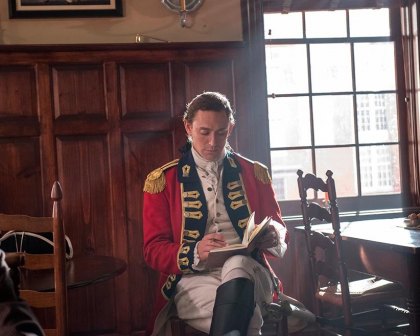John André, melancholy spymaster

Think “M” from James Bond, but lovesick.
Now in its third season, Turn, AMC’s drama of the American Revolution, is swiftly building to one of the most dramatic episodes of American history. As told on the program, Peggy Shippen (Ksenia Solo), acting at André’s behest, persuades Gen. Benedict Arnold (Owain Yeoman) to betray the American cause. In the process, the well-to-do Shippen becomes engaged to Arnold. Alas, André still loves Shippen.
As a consequence, André, compellingly portrayed by JJ Feild, broods in a tavern while sketching pictures of his beloved and ordering drinks from a seemingly discrete bartender, Robert Townsend (Nick Westrate), who, unbeknownst to André, is also an American spy.
The drama is loosely based on history but makes broad use of literary license in telling the story. In our fifth post about the historical drama, here is an overview of what writers and scholars tell us about André’s work as a spy, along with sources for further study:
The basics: André was born in 1750 in London. His father was from a family of Swiss merchants, and his mother was from France, according to The Traitor and the Spy, Benedict Arnold and John André, by James Thomas Flexner (Syracuse University Press; 1991). His father died in 1769, when André was 19. Two years later and after a broken engagement, André bought a second lieutenant’s commission in the Royal Welsh Fusiliers.
Sent to North America in 1774, he joined a regiment in Quebec and was later taken prisoner during a siege of the fort at St. Johns. In 1776, he was freed as part of a prisoner exchange. He then put together a letter that included maps and information he had been able to gather while a prisoner. This impressed Gen. William Howe, Flexner writes.
Upwardly mobile: Considering that he joined the military in 1771, André’s rise was nothing short of meteoric. While accounts differ on the dates, the book, Liberty! The American Revolution, by Thomas Fleming (Viking; 1997) gives 1777 as the year André became director of intelligence for the British. “In November 1778, André was promoted to major and named adjutant general by General Henry Clinton, the British commander-in-chief,” recounts the website for George Washington’s Mount Vernon.
As spy: As part of the job, André had to separate solid information from hogwash.
One man, Alexander Brink, “appeared on the lines at Kingsbridge shouting his loyalty to the Crown and bringing some intelligence,” Flexner writes in The Traitor and the Spy. But papers found on Brink referred to him as Lieutenant Brink. “Yes, he [Brink] said, he had joined the militia, but only to better serve the King. He had connections in Canada and would take messages to the British general there, but first he would like to rest for a day or two on Long Island.”
André denied this request and gave Brink dispatches to carry north, according to Flexner. “Brink made excuses for not starting and finally returned to New York with new reasons for going to Long Island. André threw him in jail.”
On the other hand, Ann Bates, a former schoolteacher married to a British soldier, became an accomplished spy for André, writes Fleming in Liberty: The American Revolution. “Disguised as a peddler, Ann wandered boldly through the American army’s camp, counted the exact number of their cannon, overheard conversations at Washington’s headquarters and accurately predicted the American attack on the British base in Newport, Rhode Island, in 1778.”
Death: André was captured after leaving a meeting with Arnold, who was to surrender West Point. Out of uniform when taken into custody, André was subsequently hanged as a spy on Oct. 2, 1780. (We’ll return to the subject of Arnold’s betrayal and Andre’s capture at a later date.)
Sources:
- Encyclopedia Britannica, John Andre, British military officer.
- Liberty! The American Revolution, by Thomas Fleming (Viking; 1997).
- The Traitor and the Spy, Benedict Arnold and John André, by James Thomas Flexner (Syracuse University Press; 1991).
- Washington’s Spies: The Story of America’s First Spy Ring (Bantam; 2006), by Alexander Rose.
- George Washington's Mount Vernon: John André.
- University of Michigan, Clements Library: Spy Letters of the American Revolution, John André.
- Westminster Abbey--John André.
Related:
Simcoe: Turn's British (Colonial) villain
Turn: Peggy Shippen as femme fatale
Fact, fiction and 'Turn,' the Colonial spy drama
'Turn' serves up revolutionary history
If you would like to comment, give us a shout, or like us on Facebookand tell us what you think.

